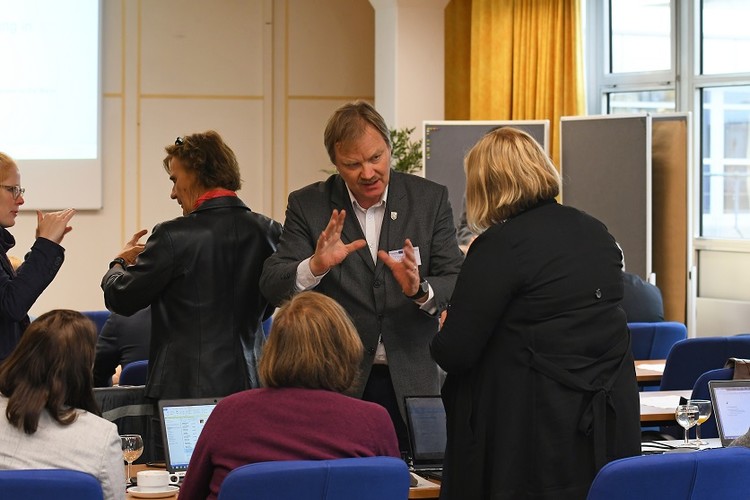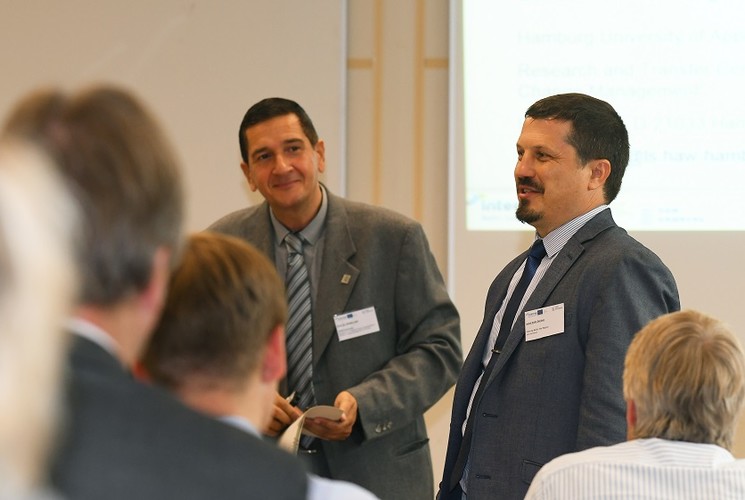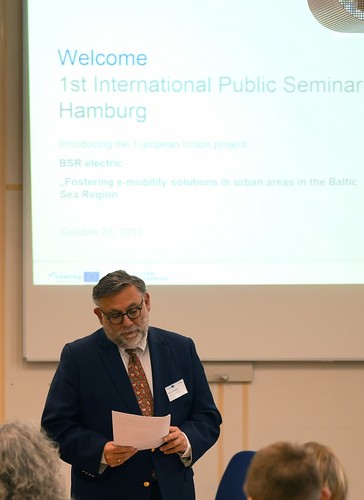Capacity Building Seminar Hamburg
The Dean of the Department of Life Sciences at the Hamburg University of Applied Sciences, Prof. Andreas Biesterfeld, welcomed all participants and speakers to the first capacity building seminar and to the lovely city of Hamburg that is working hard on fostering e-mobility in its metropolitan area.
As first presentator, we had the pleasure to welcome Jozsef Attila Darabos, our Interreg Baltic Sea Region/Joint Technical Secretariat Project Manager. He pointed out the “Importance and value of INTERREG BSR for BSR cities and regions” and highlighted the crossborder and transnational challenges we are going to tackle to foster knowledge transfer.
Thereafter, Prof. Dr. Walter Leal, Head of the Research and Transfer Center Sustainability and Climate Change Management at HAW Hamburg - the project lead - introduced the BSR electric project and its goals and outputs to be acheived over the next three years.
Peter Lindlahr of the Hamburg public private partnership organization hySOLUTIONS GmbH was our key note speaker. He pointed out the “Perspectives of E-Mobility in the City of Hamburg”. Their main tasks are in project development and management on topics of hydrogen / fuel cell technology and in battery electric drives, which is why he could present a very good overall picture of the status of electric vehicles in Hamburg. In his opinion, Hamburg is on a good way, yet much remains to be done. The main fields of action for EV development are: Public Transport, Commercial & Public Fleets, Carsharing, Urban Development, and Public Charging. The City of Hamburg is aiming to reach the following goals: 50% electrification until end of 2020 in the core administration (ministries, city departments, district administration); and 35% electrification until end of 2020 in municipal companies like sewage/water, electricity, garbage, airport, etc. With these ambitious targets, Hamburg sees itself as a role model for public charging infrastructure, as up to 1.000 charge points shall be available by early 2019, with 150 exclusively for car sharing fleets.
As regards public buses, a clear vision is followed: From 2020 onwards only zero-emission buses are to be purchased by municipal PT operators. Lastly, he stated that Hamburg is working on the taxi situation as well, yet new funding schemes on federal level are necessary and expected (75m EUR over the next three years), as well as an efficient charging concept is required.
After the key note, some of our use cases presented their tasks. Use case 3 of our partner the Borough of Bergedorf in the Free and Hanseatic City of Hamburg will work on the question of “How can e-buses be effectively integrated into public transport systems of BSR cities?”.
Gdansk, use case 4, will elaborate “How to boost the use of e-bikes for multimodal trips in a metropolis and how to integrate e-bikes into bike sharing systems?”, and our partners of the Region Environmental Services Authority HSY in Helsinki, use case 5, want to find out “How can family households be motivated to replace second cars with e-bikes?”.
After the presentations, there was time for an open discussion and Q&A session for the close to 50 participants of the seminar to dive deeper into the topic. Most importantly, stakeholders wanted to know from Peter Lindlahr, how Hamburg is tackling the extension of the public charging infrastructure. In his experience, it is a lot due to the legal framework and support of the topic from regional legislation. However, there are challenges from federal legislation as to the requirements/standardization of the technicalities of the chargers, which are currently being worked on.
Also, stakeholders were interested in the procurement process for e-buses. Peter Lindlahr and the presenting partners form use case 3 answered that it is indeed very difficult due to the lack of sufficient European providers/buses available. There are a lot of Chinese providers that can supply relatively fast, but quality and maintenance are difficult for the public bodies.
Walter Leal of HAW Hamburg concluded the meeting by pointing out the exciting experiences this project is facing – and the high relevance of not only e-mobility, but especially the approach that BSR electric is taking by piloting different modes of transport than the commonly referred to e-car.

Prof. Dr. (mult.) Dr. h.c. (mult.) Walter Leal
Franziska Wolf
Arjun Jamil
Marion Mundhenk
Nicolas Restrepo Lopez
Research and Transfer Centre „Sustainability and Climate Change Management“
Hamburg University of Applied Sciences
Ulmenliet 20
21033 Hamburg
T +49.40.428 75-6324 / -6331 / -6358
bsr-e@ls.haw-hamburg.de





